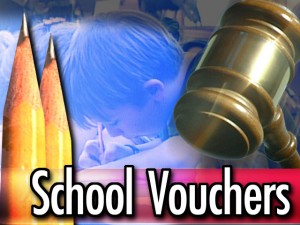
The state of America’s public schools is in dramatic decline; the fact that this generation will be less literate than the last makes this inarguable. The situation is not one that can simply be solved by continuing to throw more money into our schools. Since 1970, total federal spending on elementary and secondary education has increased 260 percent (accounting for inflation), yet this jump in spending has failed to produce a similar increase in results — scores on the National Assessment of Educational Progress have experienced virtually no change since it began in the 70s (nor is this the result of expectation inflation, as the NAEP uses “the same assessments decade after decade”). It is time for America to consider different education reforms beyond blindly increasing education spending like running a hose into an already overflowing bathtub.
On that note, last week, millions of people across the country celebrated National School Choice Week. The celebration had over 180 partner organizations that spanned our nation’s diverse ethnic, religious, geographic, and political spectra (including the Rochester City School District). This shows that school choice is not just an attempted power grab by a specific group, but it is about making meaningful reform to save a system in distress that America’s children are depending upon.
Though specific proposals vary, the most effective school voucher reform would allow parents to have a voucher equal in amount to the taxes they pay to support public schools and use it towards private school tuition. Instantly, parents and children have the freedom to choose from multiple schools when deciding where they would like to send both their own child and their own hard-earned money. Rather than coercing families by forcibly taking their income through taxes and practically imposing a government run system on them, all families — rich, poor and middle-class — would have their education options significantly broadened. The current system, on the other hand, can be likened to being extorted year after year and having the extorter kidnap your child for eight hours a day in order to support his crooked scheme, unless you can afford to make a significant additional payment.
In terms of results, as is inherently true with competition, opening up private and public schools to compete with each other will force both sides to refine what they do and better themselves. As such, in the few areas that vouchers have been used, test scores have improved in both the public and private schools, and at a lower-per-pupil cost than areas without school choice. At a time when families and governments are strapped for cash, voucher reform would make schools more efficient and productive, further strengthening the studies that have observed boosts in parental satisfaction because of having greater school choice freedom. One of the arguments against school choice is the thought that, once a voucher system is implemented, there will be a rapid exodus from public schools to private schools. Here’s the thing: if that ended up being true, wouldn’t it be because students and parents saw the private schools as a better opportunity? What worries the public school administrators and teachers’ unions is that, if school vouchers are allowed, the flawed system that they uphold and represent will finally be wholly exposed. If they truly believed they were capable of providing a better education than private schools, they would not fear school choice as they do. God forbid administrators actually have to fire bad teachers and keep exceptional ones.
While this makes it sound like bad news for many teachers, in reality, school choice would benefit them. If public schools lose students and teachers because students go to private schools, those schools will also need to hire new teachers to meet the rising demand. Additionally, all school administrators will look to their teachers for input on how to most effectively cut costs in the classroom, the most base level of education spending. Though it has everything to do with what goes into children’s minds, school choice is simply a no-brainer.
